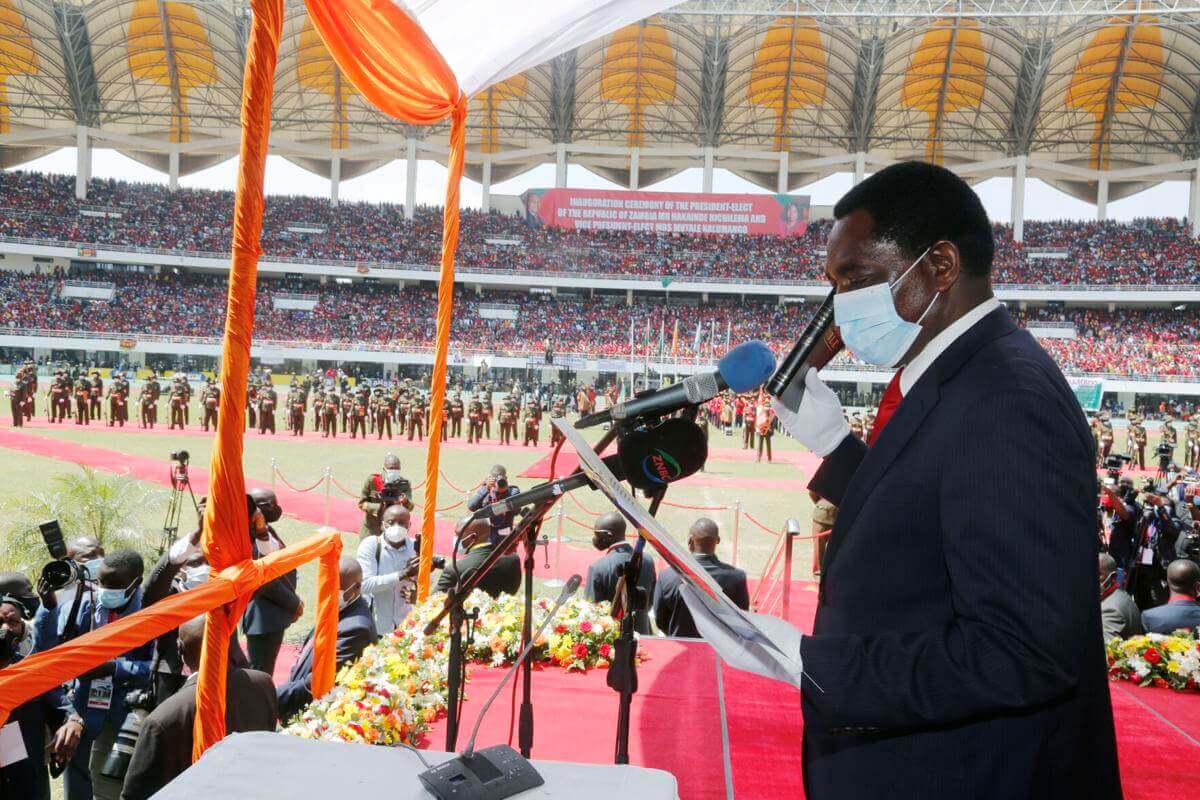Hakainde Hichilema, 59, was sworn in as Zambia’s seventh president on Tuesday after he defeated incumbent leader Edgar Lungu, who was seeking a second term in office, earlier this month. Hichilema won 60.8% of the votes in his sixth attempt at becoming president, securing almost one million more votes than Lungu.
Hichilema was joined in his swearing-in ceremony by fellow party members from the United Party for National Development as well as thousands of supporters. Hichilema’s running mate, Mutale Nalumango, meanwhile, was sworn in as the country’s second female vice president. The event was also attended by Tanzanian President Samia Suluhu Hassan and Malawian President Lazarus Chakwera, among other current and former African leaders from the Democratic Republic of Congo, Kenya, Nigeria, and South Africa.
Hichilema’s victory has inspired people across sub-Saharan Africa, given that opposition victories have become extremely rare in the region, with only 17 such instances recorded since 2015.
Tanzanian opposition leader Tundu Lissu, who lost in the country’s October 2020 election to erstwhile leader John Magufuli under questionable circumstances, called Hichilema’s win “massively inspirational,” saying, “Zambians have showed us it can be done, no matter what they put us through, no matter the odds.”
Likewise, Zimbabwean opposition leader Nelson Chamisa told CNN: “This is a significant and fantastic for what is possible for the future of Africa. Zambia is an inspiration to stubborn laggards in democracy. Strong institutions are key for effective power transfer and smooth transitions.”
However, Zimbabwean President Emmerson Mnangagwa has already warned: “What happened in Zambia will not happen here,” with his spokesperson even suggesting that the army could be brought in to obstruct a transfer of power to the opposition.
The Zambian population, too, was evidently enthusiastic about the possibility for change, with voter turnout recorded at 70.9%, a huge leap from 57.7% in 2016.
Under Lungu, Zambia spiralled into an economic crisis and recently defaulted on billions of dollars of debt. It now owes over $12 billion in external debt, or 80% of its GDP. Although a rise in copper prices has fuelled some optimism about an economic recovery, inflation remains at a high of 24%.
Keeping this in mind, during his swearing-in ceremony, Hichilema vowed to usher in a “new dawn,” saying: “We will grow our economy so we can lift more people out of poverty than ever before.”
He also pledged to address the corruption that had become synonymous with the Lungu administration.
Meanwhile, rights group Amnesty International referred to the beginning of Hichilema’s term as an “opportunity to turn the tide on the country’s worsening human rights situation.” To this end, the organisation called on Hichilema to “prioritise protecting freedom of expression and association, take decisive action to end abuses by police and place socio-economic rights on his agenda, including tackling inequality, poverty, unemployment, collapsing healthcare system and poor education funding.”
The group also urged the new administration to protect the rights to freedom of expression and peaceful assembly, pointing to the fact that at least five opposition leaders and activists have been killed by police since 2016, wherein “authorities [have] weaponised the law to criminalise peaceful dissent, charging critics with a wide range of offences including criminal defamation, incitement of public disorder and sedition.”
Furthermore, Amnesty International urged Hichilema to protect the freedom and independence of the press as yet another measure to “pull Zambia back from the brink.”
Therefore, although Hichilema’s first order of business will be to resuscitate the country’s economy, there are a number of other parallel concerns that he will be tasked with on day one.
Hichilema Sworn In As Zambian President in Rare Opposition Victory in Sub-Saharan Africa
August 25, 2021

Newly-elected Zambian President Hakainde Hichilema SOURCE: STR
